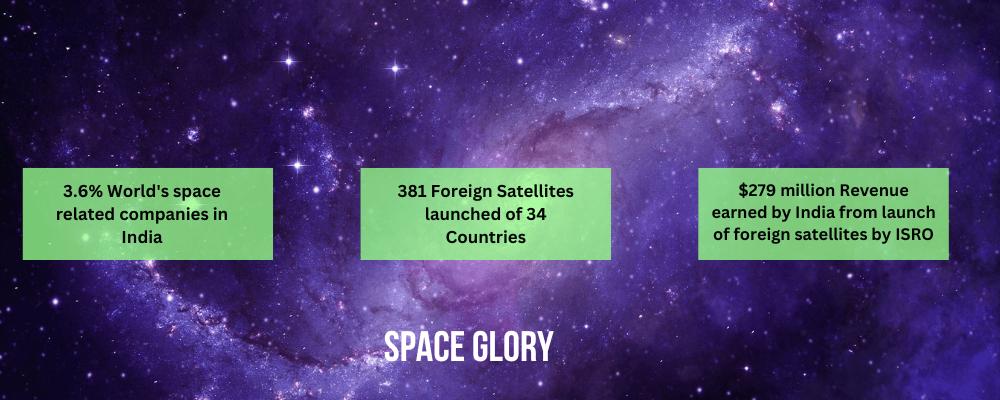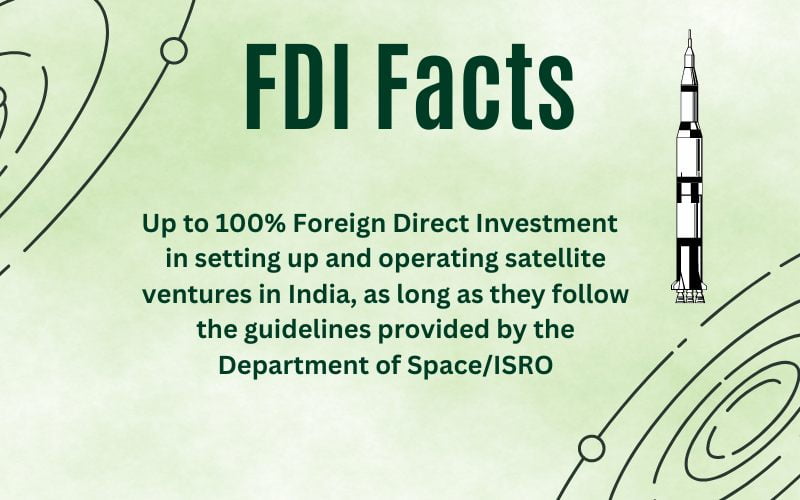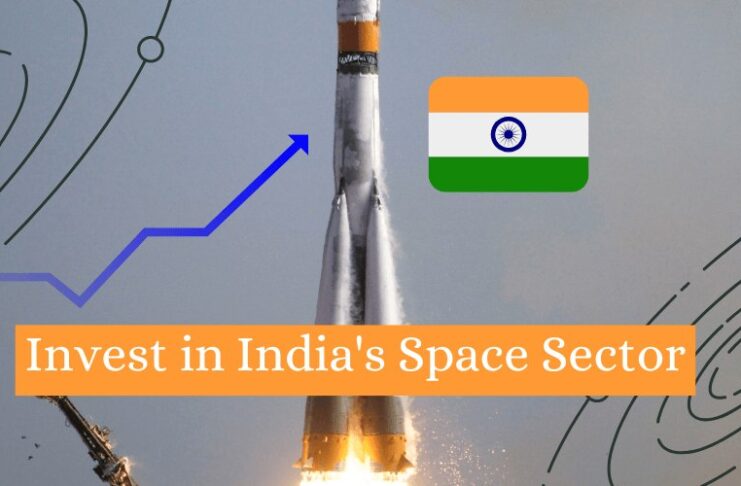India’s space industry is known for creating affordable satellites and achieving remarkable feats like successfully sending Mars probes on the very first attempt, as well as launching numerous foreign satellites into space. Currently contributing around 2-3% to the global space economy, India aims to increase its share to over 10% by 2030.
ISRO : Indian Space Research Organisation is the national space agency of India
ISRO manages and runs India’s space program. It has made significant Progress in recent years and is now one of the top leading space agency in the World, ISRO is a trailblazer in space exploration. It’s well-known for creating unique satellites, accomplishing successful missions, and conducting groundbreaking research. By concentrating on affordability and dependability, ISRO keeps striving to break barriers, making space technology usable and influential not just for India but for the entire globe.
ISRO ranks as the sixth largest space agency globally and boasts an impressive track record of achievements, ISRO has established six agreements with four countries to launch their satellites. These missions have the potential to generate revenues of up to USD 141 million from a business perspective recently. In 2023, the Chandrayaan-3 mission achieved a successful launch. This marks India’s third lunar expedition and the initial endeavor to softly land on the moon’s surface since Chandrayaan-2 in 2019.
Reason to Invest in India’s Space Sector :
- The Indian space economy is projected to reach a value of $13 billion by the year 2025. ISRO and the European Space Agency (ESA) have expanded their collaboration beyond earth observation and space exploration to various other domains. They have signed cooperative agreements for Network and Operations Cross-support, as well as for ESA’s ground station assistance in ISRO’s Chandrayaan-3 and Aditya-L1 missions. ISRO/DOS and India have entered into space collaboration agreements with space agencies from 61 countries and five international organizations.

- Emphasizing developmental missions, the safety and quality teams concentrated on certifying, ensuring quality, and enhancing safety for innovative technologies related to the Re-usable Launch Vehicle – Landing Experiment (RLV-LEX) and the inaugural developmental flight of the Small Satellite Launch Vehicle (SSLV D1).
- ISRO achieved a successful demonstration of new technology through the Inflatable Aerodynamic Decelerator (IAD) – an innovation that has the potential to revolutionize various applications in upcoming missions.
- From 1999 to 2022, India has conducted 381 commercial launches of foreign satellites for 34 different countries. Notably, on October 23, 2022, a batch of 36 OneWeb Gen 1 communication satellites were launched simultaneously.
“The space economy of India is projected to reach $40 billion by the year 2040.” Dr Jitendra Singh
In 2014, India had only four space startups, but now, the number has risen to over 150. The space industry in India currently stands at $8 billion and is projected to reach $40 billion by 2040,” stated Union Minister of State for Science & Technology, Jitendra Singh. He went on to mention that in 2014, there were 350 startups in the country, but today, the count has surged to over 1.3 lakh startups, including 130 highly successful ones known as ‘unicorns.’ Among these startups, approximately 6,000 belong to the unicorn sector, which has significantly stimulated innovation in India. He shared these insights while inaugurating the S20 Conference at Amity University under the aegis of the G20.
Details of the sector:
SATELLITE MANUFACTURING : Government agencies and private entities collaborate to manufacture components of satellites and their launchers. An example of this collaboration is PSLV-C53, which represents India’s initial official public-private partnership for a space launcher.
SATELLITE LAUNCH SERVICES: ISRO offers launch facilities for both private and international entities.
At present, India manages two types of launch vehicles: the Polar Satellite Launch Vehicle (PSLV) and the Geosynchronous Satellite Launch Vehicle (GSLV). PSLV has completed 55 launches, with 52 of them achieving success.
SATELLITE LAUNCHES: Under ISRO’s leadership, the Indian Space Program has accomplished significant milestones, solidifying India’s reputation on the world stage as a dependable source of affordable and effective space solutions.
NewSpace India Limited (NSIL) was founded as ISRO’s commercial subsidiary, aiming to shift the commercial aspect of the space sector from ISRO. This involves generating demand from private entities through models such as Technology Transfer and aggregator economy.
Space: A growing Opportunity
Recognizing the significance of the Private Sector, the Prime Minister of India highlighted, “India must enhance its global space industry contribution, and the private sector will play a pivotal role in achieving this goal.”
At present, the sector witnesses participation from over 400 industrial enterprises, encompassing major Indian conglomerates and SMEs. These entities collaborate under ISRO’s guidance to develop subsystems for space launch and ground infrastructure.
NewSpace India Limited (NSIL) has been entrusted with the role of being the exclusive public-sector aggregator, facilitating the demand and supply of space assets and services on a commercial basis. This includes offering satellite-based applications commercially and involving private players in the production and launch of PSLV and other launch vehicles.
NSIL’s strategic plan involves an investment of USD 1.2 billion over the next five years. This infusion aims to elevate industry participation and promote commercial ventures in the sector.
Foreign Direct Investment (FDI) :

FDI in India’s space sector
Top 5 Indian Companies in Space Race
New innovation areas of Satellite Communications :
As innovations continue to emerge in fields like satellite communication and various other applications, such as geospatial data-driven services, the demand for space-related services is growing. This surge in demand highlights the necessity for more entities to enter the upstream and downstream segments of the space industry. These players are essential to deliver commercial solutions and services.
International Collaboration and Encouraging Private Players :
Private entities have the opportunity to engage in the establishment of ground stations for spacecraft, a significant portion amounting to 48% of the space sector budget. Additionally, they can explore applications of space technology, contributing to 45% of the space economy. The rising sectors for private involvement also include the small satellite segment and component manufacturing.
Synergistic Collaboration with Aviation and Defense Industries :
Bengaluru ranks among the top three global aerospace and defense cities in terms of attracting foreign investments. Moreover, India holds a prominent position as one of the leading countries worldwide for defense procurement and related manufacturing.

Invest In Official Portal Of Government Of India Space Sector – Read More
What is the single window approval system in Space sector?
The Indian National Space Promotion and Authorization Centre (IN-SPACe) serves as an independent, single-window nodal agency operating autonomously within the Department of Space (DOS). It streamlines and expedites the approval process within the space sector by providing a unified point of contact.
What is NSIL?
NSIL functions as the business extension of the Indian Space Research Organisation (ISRO). Its main role involves facilitating advanced space-related endeavors within Indian industries. Additionally, NSIL is tasked with promoting and capitalizing on the products and services derived from India’s space initiatives.
What are industrial cluster of aerospace and where?
Industrial clusters refer to the gathering of interconnected or multiple industrial sites, often in the aerospace sector, situated in close proximity to each other. India has set up numerous industrial clusters such as the Salem Aerospace Cluster in Tamil Nadu, the Belagavi Aerospace Cluster, the Aerospace and Innovation Centre in collaboration with IISc at Chitradurga, the Devanahalli Cluster, among several others.
FDI policy in India’s Space Sector ?
Under the government route, foreign direct investment (FDI) of up to 100% is permissible for the establishment and operation of satellites, while adhering to the sectoral guidelines of the Department of Space/ISRO.
Industrial Land Bank Portal One window for Investment in India
GIS – based map displaying available infrastructure for setting up business operations in the state.
Know More








[…] Also Read- Investing in India’s Space Sector : Seize the Opportunity to Invest in India’s Thrivi… […]